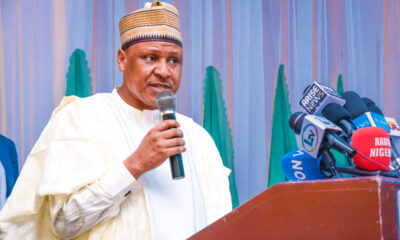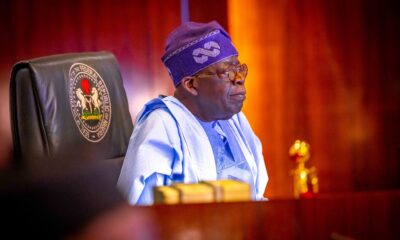Business
States cannot ban mining activities, minister tackles govs

States cannot ban mining activities, minister tackles govs
Minister of Solid Minerals Development, Dele Alake has declared that governors do not have the constitutional powers to ban mining activities.
He made the statement during a pre-event press conference in Abuja ahead of the 8th edition of the annual Nigerian Mining Week 2023 slated for October 16-18,2023 in Abuja.
According to him, mining remains on the exclusive list of the Federal Government in the Constitution, hence it is not under the purview of a state governor as far as the enactment laws, and regulations of operations of solid minerals are concerned.
The minister cautioned governors to desist from taking laws into their hands to regulate the sector and said it is illegal to do so, which also they are not constitutionally empowered to regulate oil and gas activities.
He said, “The state’s ban on mining activities across the court is a point that is really sore. And it’s a constitutional matter. I want to use this opportunity to get to the entire Nigerian public that no state and I repeat, no state has the authority to interfere in mining operations, no state has the authority and it is not it’s a no-brainer. It’s a constitutional matter.
“Mining belongs exclusively in the purview of the federal government, according to the Constitution. It is in the exclusive legislative list. It is not in the residual.
“It is not in the concurrent it’s in the exclusive legislative list. Every item on the exclusive, legislative list belongs to the federal government.
“There is no doubt about that. All items on the residual list belong to the states and all items in a concurrent section belong to both, but mining like oil and solid Minerals belongs in the exclusive legislative, therefore, it is the federal government that has the authority.
“Legal authorities as supported by the Constitution make laws regulations and operationalization of the Solid Minerals resources of Nigeria.
“Now, because of the peculiar nature of solid minerals, because of the involvement of the local communities or the host communities, there is an engagement even in the regulatory framework of mining operations.
“There is an engagement close with the host communities and the federal government through the Ministry of Solid has been engaging with host communities in fact, in the licensing operations or processes or procedures, there is a provision for the engagement with the host communities. Now these host communities also belong in the various states.”
He however pointed out that, “we are not against any state that wants to engage a mining operations as long as it follows due process.
“If any state wants to engage in mining, it can form its own Special Purpose Vehicle, SPV, apply for a mining licence from the office of the Minister of Solid Minerals; go through the due process and be so licensed if it meets all the criteria. Such a state is like any company or like any individual, institution, or corporate body.
“But for a State to wake up and say it is regulating mining activities is like a state waking up to ban oil exploration; it is downright illegal.”
Business
Naira Could Trade Below ₦1,000/$ With Dangote Refinery at Full Capacity — Otedola

Naira Could Trade Below ₦1,000/$ With Dangote Refinery at Full Capacity — Otedola
Billionaire businessman Femi Otedola has projected that the naira could strengthen to trade below ₦1,000 per US dollar as the Dangote Petroleum Refinery achieves full operational capacity. The prediction comes as Nigeria anticipates a major boost in domestic fuel production, potentially reducing import dependence and easing pressure on the foreign exchange market.
Otedola made the projection in a post on X, congratulating Aliko Dangote on the refinery reaching its designed processing capacity of 650,000 barrels per day (bpd). He described the milestone as a historic moment for Nigeria’s energy sector, saying it could positively impact the naira exchange rate, foreign reserves, and overall economic stability.
According to Otedola, the refinery’s capacity to produce up to 75 million litres of Premium Motor Spirit (PMS) daily positions Nigeria to meet domestic fuel demand and even generate surplus for export. He highlighted that this would reduce the country’s reliance on imported petroleum products, which historically exerted heavy pressure on the naira and foreign exchange resources.
READ ALSO:
- Adeyanju Urges EFCC, DSS to Probe El-Rufai Over Alleged Corruption, Insecurity in Kaduna
- Granite-Laden Truck Kills Motorist, Leaves Wife Critically Injured in Lekki–Ajah Crash
- City Boy Movement Receives Bus Donations from Zenco, Obi Cubana for Tinubu’s Campaign
“With domestic refining now firmly underway after decades of reliance on imports, pressure on the foreign exchange market should ease significantly, potentially pushing the naira below ₦1,000/$ before year-end,” Otedola said. He also noted that the EFCC and monetary authorities’ support in maintaining a conducive economic environment would complement these gains.
The Dangote Refinery, located in the Lekki Free Zone, Lagos, is Africa’s largest single-train refinery. Experts say that reaching full production will conserve billions of dollars previously spent on importing refined petroleum products and strengthen Nigeria’s foreign exchange reserves. Plans are also underway to expand refining capacity to 1.4 million bpd, with increased production of petrochemicals like polypropylene and linear alkyl benzene, further reducing industrial import dependence.
Economic analysts have welcomed the refinery’s milestone but caution that naira stability will still depend on broader macroeconomic reforms, oil prices, foreign capital inflows, and Central Bank of Nigeria (CBN) policies. Nevertheless, Otedola’s projection reflects renewed optimism that domestic refining capacity could be a turning point for the Nigerian economy, energy security, and the foreign exchange market.
Naira Could Trade Below ₦1,000/$ With Dangote Refinery at Full Capacity — Otedola
Business
Dangote Refinery Slashes Petrol Price to ₦774, Ends PMS Bonus Window

Dangote Refinery Slashes Petrol Price to ₦774, Ends PMS Bonus Window
Dangote Petroleum Refinery and Petrochemicals FZE has announced a reduction in the gantry price of Premium Motor Spirit (PMS), commonly known as petrol, by ₦25 per litre, lowering the ex-depot rate from ₦799 to ₦774 per litre. The new pricing took immediate effect on Tuesday, 10 February 2026.
The refinery notified petroleum marketers through its Group Commercial Operations Department, stating:
“This is to notify you of a change in our PMS gantry price from ₦799 per litre to ₦774 per litre.”
Industry checks on platforms like petroleumprice.ng confirmed that the revised price has already been updated across petroleum pricing systems, ensuring transparency for downstream operators and consumers.
In the same notice, Dangote Refinery announced the end of its PMS lifting incentive programme, which had offered marketers bonuses for purchasing within specific volume thresholds. The refinery stated that credits for volumes loaded from 2 to 10 February 2026 would be posted to marketers’ accounts.
READ ALSO:
- El-Rufai: I Supported Tinubu Out of Party Principle, Not Friendship
- Trump Approves Deployment of 200 U.S. Soldiers to Support Nigeria’s Fight Against Terrorists
- Atiku Rejects Mixed Result Transmission
Analysts say the simultaneous price cut and closure of the bonus window signals a shift from volume-driven incentives to a more stable and predictable pricing framework, as the refinery consolidates its domestic market share.
The move comes amid continued volatility in PMS prices following the full deregulation of Nigeria’s downstream petroleum sector and the removal of fuel subsidies. In 2025, ex-depot prices fluctuated between ₦700 and over ₦800 per litre, driven by exchange rate pressures, global crude oil prices, and reliance on imported fuel, which in turn pushed pump prices higher nationwide.
With a production capacity of 650,000 barrels per day, Dangote Refinery — Africa’s largest single-train refinery — has become a key reference point for domestic fuel pricing. Its operations have helped moderate petrol prices, especially in southern and coastal distribution corridors, and reduce Nigeria’s dependence on imported fuel.
Industry observers note that the latest price reduction reflects easing production costs, improved operational efficiency, and increased competition from imported cargoes and modular refineries. As the refinery continues to expand, its pricing decisions are expected to influence national petrol rates, transportation costs, and inflationary pressures.
Dangote Refinery Slashes Petrol Price to ₦774, Ends PMS Bonus Window
Business
Fuel Self-Sufficiency: Dangote Refinery Counters Misinformation on Petrol Imports

Fuel Self-Sufficiency: Dangote Refinery Counters Misinformation on Petrol Imports
The Dangote Petroleum Refinery & Petrochemicals has clarified that there is no importation of finished Premium Motor Spirit (PMS) — commonly known as petrol — into Nigeria, countering recent reports suggesting otherwise. The company stated that locally refined petrol from the Dangote Refinery now meets a significant portion of Nigeria’s domestic demand, marking a major milestone in the country’s journey toward fuel self-sufficiency.
In a statement, the refinery dismissed claims that it imports finished PMS as false and misleading, stressing that such reports misrepresent its operations and could undermine public confidence in Nigeria’s local refining sector. The company also indicated that it has identified individuals behind these claims and warned that legal action may be pursued against parties spreading misinformation.
Oil marketers and industry observers confirm that the refinery has consistently supplied petrol to the Nigerian market, reducing reliance on imported fuel. The move has been welcomed by stakeholders, including the Independent Petroleum Marketers Association of Nigeria (IPMAN), which advised its members to prioritize purchasing petrol from Dangote’s facility to support domestic refining and strengthen local fuel supply chains.
READ ALSO:
- “Electoral Act Amendment: El-Rufai Calls Akpabio ‘Tinubu’s Lapdog’”
- Lookman Reflects on Bittersweet La Liga Debut as Atletico Madrid Fall at Home
- Fayose Claims Presidency Told Wike to Respect Fubara or Risk Losing Job
This announcement comes amid broader efforts to revamp Nigeria’s state-owned refineries. Talks are ongoing between the Nigerian National Petroleum Company (NNPC) and technical partners to enhance capacity at existing refineries, aiming to further reduce the country’s dependence on imported petroleum products.
Analysts say that the rise of local refining through Dangote’s facility is poised to have several benefits for Nigeria, including stabilizing fuel supply, saving foreign exchange, and potentially moderating fuel prices. As the refinery ramps up production, Nigerians can expect more reliable access to locally refined petrol, signaling a shift from historical dependency on imported fuel toward greater energy self-reliance.
The Dangote Refinery, now one of the largest in Africa, continues to deliver substantial volumes of petrol and other refined products across Nigeria, underlining its central role in the country’s energy infrastructure and the nation’s ambition to achieve self-sufficiency in petroleum products.
Fuel Self-Sufficiency: Dangote Refinery Counters Misinformation on Petrol Imports
-

 News3 days ago
News3 days agoOyo Muslims Reaffirm Loyalty to Sultan on Islamic Matters — Grand Chief Imam
-

 Education16 hours ago
Education16 hours agoSupreme Court Affirms Muslim Students’ Right to Worship at Rivers State University
-

 metro15 hours ago
metro15 hours agoIKEDC Sets Feb 20 Deadline for Customers to Submit Valid IDs or Face Disconnection
-

 metro3 days ago
metro3 days agoFormer NAHCON Chief Explains Why He Stepped Down, Denies Conflicts
-

 Business2 days ago
Business2 days agoDangote Refinery Slashes Petrol Price to ₦774, Ends PMS Bonus Window
-

 metro2 days ago
metro2 days agoKwara, Katsina Bloodshed: TMC Condemns Attacks, Dismisses ‘Jihadist Preacher’ Claims
-

 Business18 hours ago
Business18 hours agoNaira Could Trade Below ₦1,000/$ With Dangote Refinery at Full Capacity — Otedola
-

 News3 days ago
News3 days agoLagos Announces Four-Week Partial Closure of Lagos-Abeokuta Expressway















